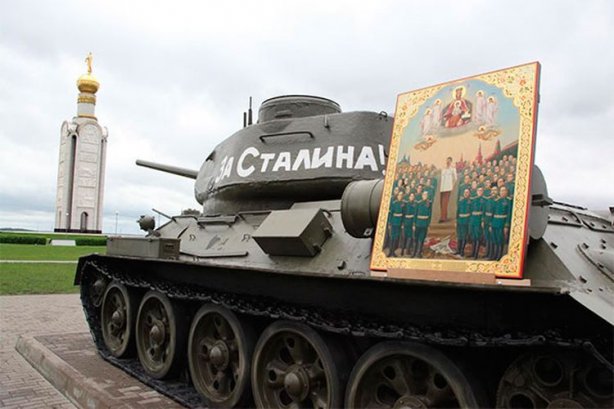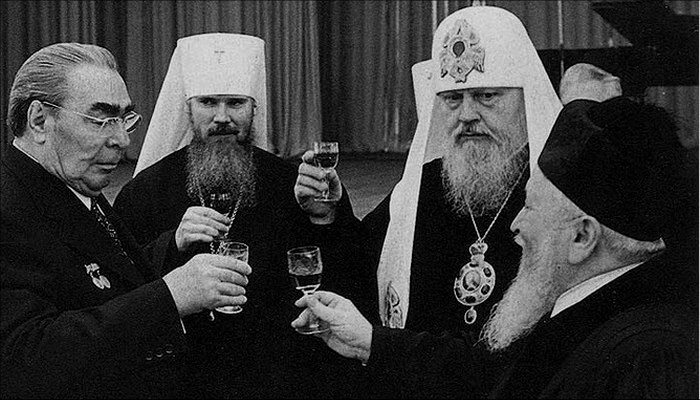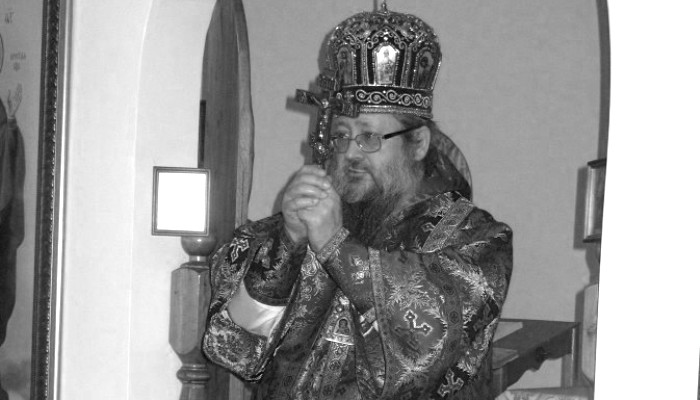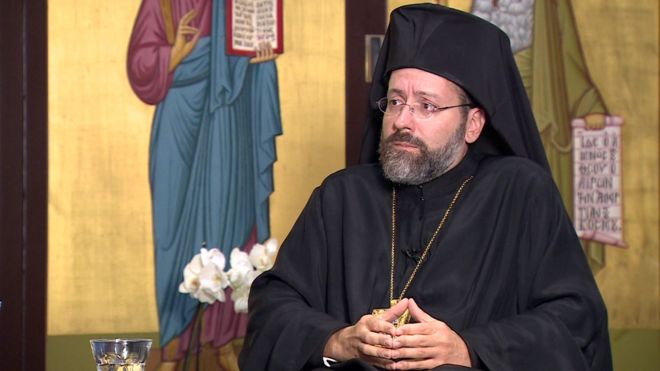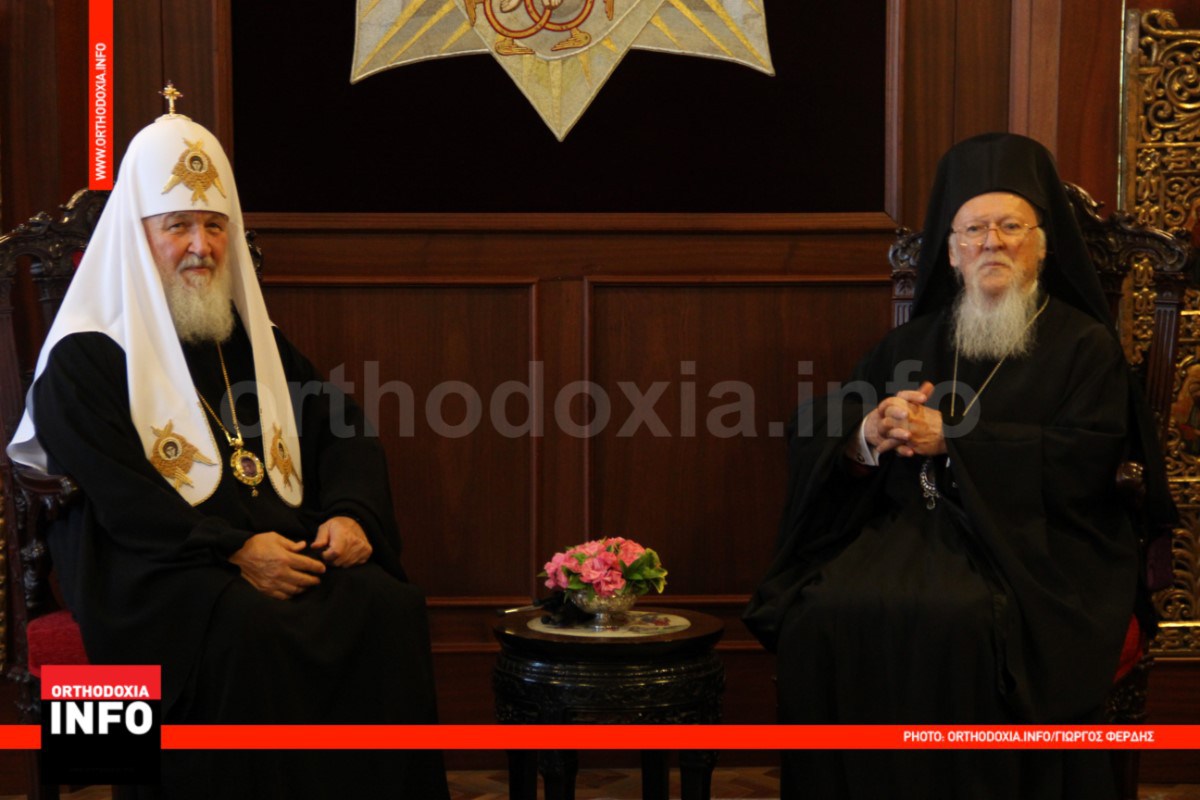Moscow Patriarch Kirill of the Russian Orthodox Church demonstrated a new level of flexibility — personally and, it is important to note, in the organization he controls — when he called on the average TV viewer not “to turn a blind eye” to the significant economic, political and military achievements of a ruler, even one known for “committing evil.”
As you probably know, the discussion had to do with Joseph Stalin, who took the country “from rake to bomb” (am I the only one to perceive a satanic double meaning in this phrase?), a recognized “effective manager,” and the “father of victory.”
Among the public a suspicious but natural question arises: does this concern only the “Coryphaeus of Science” (one of the many grandiloquent Soviet titles bestowed on Stalin — Ed.) or in general any villain who succeeds in being considered an “effective manager” by the masses? Is this indulgence in advance, a direct permission to “distinguish oneself through evil” just as long as one achieves victory? Does this “dispensation” mean that Patriarch Kirill is legitimizing new social and moral positions where there is no justice, no repentance, and therefore where it becomes possible and even necessary to accept any crime if it has been adequately paid for with “effectiveness?”
The question is how easy has it been for the patriarch to issue this “dispensation” to Stalin. Perhaps he had to undergo a certain spiritual evolution — from canonizing new martyrs in Russia, the victims of revolutions and Stalinist repressions, and from creating a historical department to study the fate of the repressed subjects of the Ukrainian Orthodox Church to the current appeal not to forget that the murderer has rendered certain outstanding services to the Fatherland — industrialization, victory, the bomb and ballet. Well and a few “occasional excesses” By the way, one wonders if the Ukrainian Holodomor is still considered “villainy” or perhaps, in light of current Kremlin politics, it is to some extent the “achievement of an effective manager.”
Besides, to be fair to the patriarch — he deserves fairness no less than other “effective managers” who have been guilty of atrocities — I don’t think this speech came easily for him. And I doubt that under normal circumstances the head of a church that had suffered so much from the Stalinist regime would have said something similar. Even taking into account the Stockholm syndrome, the textbook Slavic tendency to masochism, and other half-clinical diagnoses. If the patriarch has demonstrated such inhuman flexibility there must have been reasons for it.
The most obvious reason is that the Kremlin finally broke Patriarch Kirill. Of course the whitewash of Stalin is not on the same order as the repudiation of parents by children in the style of Lubyanka (KGB prison and headquarters — Ed.) of 1937, but comparable, given the general softening of morality. And this moral coercion of the patriarch is completely typical of the Kremlin. The current Patriarch of Moscow stands out too much against the background of the Kremlin-Checkist/KGB elite. He is not enough of the courtier and too much the politician, diplomat, businessman, or simply an independent player. He is too much a “man of the 90s,” who had been incorporated into the financial-political elites formed during the era of the collapse of the USSR. Like the rest of the oligarchs of this galaxy , he is a man of the past for the current Russia of Putin. As were the Nepmen (short-lived entrepreneurs in the early year of t he Soviet Union — Ed.), the kulaks, and the university professors for Stalin’s Russia. A strong hint from the Kremlin came with the appearance of Tikhon Shevkunov, the “Lubyanka archimandrite” and Putin’s “spiritual adviser,” as a possible successor to the patriarch.
However, one should give his due to Patriarch Kirill: what he is doing now by blessing all the whims of power, including giving indirect positive reviews of Stalin, he does so not only to save his own skin. He is also doing it in the interest of the church, which means little in Russia in itself aside from its connection to the “state project,” which is rapidly drifting into the virtual reality of “great victories” and corruption.
I was recently asked under what conditions would the Patriarch Kirill be able to refuse to glorify Stalin to his KGB handlers. I found only one answer — if here were the patriarch of Kyiv. Not because we are so admirable and free. But because 25% of the population attends Easter services in Ukraine compared to 2% in Russia. The absence of tangible support “from below” or of any real authority in society means the guaranteed inability to say “sorry, no” to authorities or all the more so to present any opposition at all. It means being doomed to carry out state orders even in small things. You can imagine that Putin simply reminded the patriarch — as well as everyone — that the head of the Russian Orthodox Church is on a short leash. It does not matter how many court clowns shout from the TV screens that they will “force authorities to take them into account.” That is why they are clowns, in order to entertain.
The warning bell that the Russian Orthodox Church has been fully subordinated to the Kremlin’s state religion project could have been expected after the patriarchal “Russian World” project remained with God. The patriarch as ideologist, the author of the latest “Holy Scripture of Rus” is outdated. He has partly carried out his part of the work and he has failed. The doctrine of Holy Rus, which was supposed to replace the works of Marx, Engels, and Lenin in the civil religion of Russia, went quite well for the patriarch. But if it turned out to be too universally Christian (despite numerous later amendments) or unsuitable for military purposes. Additionally, the Kremlin was obviously very disappointed that Ukraine turned out to be insufficiently saturated with the “Russian world” concept to fall at Putin’s feet at the first whistle, despite communications from the patriarch’s office in Moscow. Perhaps Patriarch Kirill really engaged in “postscripts” that exaggerated his own influence and that of his doctrines in “canonical territories.”
But certainly this is not the issue. The “Russian world” could have turned out to be a pretty effective weapon, but it simply had not been created for military purposes. The “Russian world” was being developed as a soft power, a more humanitarian technology capable of keeping Russia’s satellites in the orbit of its geopolitical and economic interests. But the Kremlin, instead of appreciating the beauty of the game, hit this creation with Grad missiles. The creation fell, just imagine! And the last illusions about the “brotherhood of nations” were buried under the rubble, and with them the patriarch’s authority in the Kremlin.
When the patriarch did not come to celebrate the annexation of Crimea with Putin, he probably knew already. War and not the “Russian world” had been chosen. The martinet Sergey Shoygu (Russia’s defense minister — Ed.) and not the patriarch. Blunt power (in all senses) and not intrigue. He understood that it was necessary to look for other means to remain afloat and at the court, and God knows he tried. But the behavior on Crimea was obviously not forgotten. And I would not rule out that this “subjugation” regarding “Stalin’s genius” is at least in part a small but incredibly apt revenge of a small but very vindictive man.
Since the beginning of the war the patriarch has been trying to find a place for the Russian Orthodox Church (and for himself) in the new “state religion” of Russia — a purely civil religion that glorifies Caesar and great victories. Until now the patriarch liked to talk about “Orthodoxy as a state-building religion,” but now the time has come for the state to create religions. Slowly, with difficulty, the cult of great triumphs and Caesar himself — both the former and the current — is moving forward. By the way, regarding Caesar, the patriarch gave an explosive speech about Stalin’s greatness against the backdrop of the refusal by Moscow authorities to rename the metro station Voykovskaya, named in the honor of one of the executioners of the Romanov family members, who have been canonized as martyrs by the Russian Orthodox Church. The security goons determine “holiness” now. It does not matter how much the patriarch may disagree; he has accepted the ugly compromise.
All these events seem entirely logical and timely in the context of the Lubyanka (KGB) revenge that according to all indications Russia is apparently experiencing now. The destruction of Memorial as a “foreign agent,” the cynical transformation of Perm-36, the museum of Stalinist repressions, to a museum of the intelligence services, the restoration of the monument to Felix Dzerzhinsky (founder of Soviet secret police — Ed.) on Lubyanka square. Incidentally, in one more symptomatic failure of the Russian Orthodox Church, the monument the iron Felix has “squeezed out” the monument to Volodymyr the Baptist and marked the destruction of the patriarch as its crowning achievement.
The point is not only that neither the hierarchy of the Russian Orthodox Church nor the patriarch Kirill himself can go into opposition simply because they have become used to power and to enormous wealth. And not only because the Russian Orthodox Church congregation trusts Putin more than the patriarch and, I’m afraid, loves Stalin more fervently than Christ himself. Therefore, the patriarch simply has no other choice than to play along with the sentiments of the majority. There are also the historical traumas. The main reason is that the church in the USSR was completely permeated with Lubyanka — therefore with fear and betrayal. Yes, a church has traumas as well, and they are almost the same as in the entire post-Soviet society. Simply in the church they understood that the thaw was over and they have returned to their normal subservience.
In addition, the patriarch has acted as a psychotherapist. The Stalin terror is sort of a thorn in the collective heart of post-Soviet Russia. Russians, including those loyal to the Russian Orthodox Church as well as the patriarch himself, find it hard to live in the cognitive dissonance of victories/ atrocities. It is a trauma that requires therapy and the patriarch acts as a good doctor who allows the patient with delusions of grandeur to continue to consider himself Napoleon. What else could he offer? Repentance?
That would not be popular despite being fundamentally Christian. But the patriarch apparently has a realistic assessment of the Christian sentiments of his countrymen. This is why he has chosen psychotherapy. That is what it is worth and let the heart be satisfied with that.
To summarize the words of the patriarch, there is nothing to repent. Not what was nor what is now. Winners hate to repent. If they do not like to repent before God, who conquered death, then they do not like to repent before people, who defeated fascism. In this civil religion of Russia the “great people” are God. In the collective body it is useless to talk about individual categories — rights, achievements, successes, sorrows. There are no names even. They are not ashamed that the soldier is “unknown” but instead create a cult out of his namelessness. And there is no individualism. There is no reflection, no painful experience of “cursed questions.” There are no questions at all — the propaganda takes care of that tirelessly.
And for purposes of virtual reality it is unimportant “what happened really.” There are no guidelines. Neither facts nor especially moral categories have any meaning. Here the logic of myth prevails, where “after this” means “as a result of this.” Therefore, if the great victory was “under Stalin” it was “thanks to Stalin.” And the Great Victory in the current Russian canon is Easter itself.
Patriarch Kirill cannot like all of this. Not only as a Christian but as an “effective manager” This civil religion, which absorbs and partially substitutes for the Russian Orthodoxy, is a serious blow to the universalism of the Russian Orthodox Church. It is possible to insist that victory in the Great Patriotic War was a “common cause of the entire Soviet people.” But first, not all of them, as Ukrainians know very well. Secondly, the issues of cost in other parts of the former USSR have not been resolved as easily as in Russia. In the Russian Orthodox Church — even in the “Russian Orthodoxy” version and using the “Holy Rus” format — universalism had much better results. The fusion with state cults threatens the Russian Orthodox Church with institutional collapse. Because even in a country as sympathetic to “Russian Orthodoxy” as Ukraine, the Kremlin state cult with its strange rituals, the adoration of the Kremlin Caesar and its version of “sacred history” will appear as relevant as the cult of Augustus in the Parthian kingdom.
Kateryna Shchotkina is a Ukrainian journalist, children’s writer and, editor of the Religion section in the Weekly Mirror (Dzerkalo Tyzhnia) publication. In 2011 she received the Blessed Karol Wojtyla (Pope John Paul II) prize for excellence in journalism dealing with religious themes.




